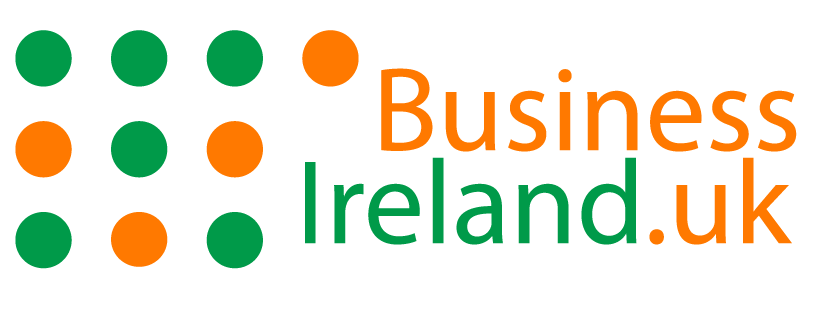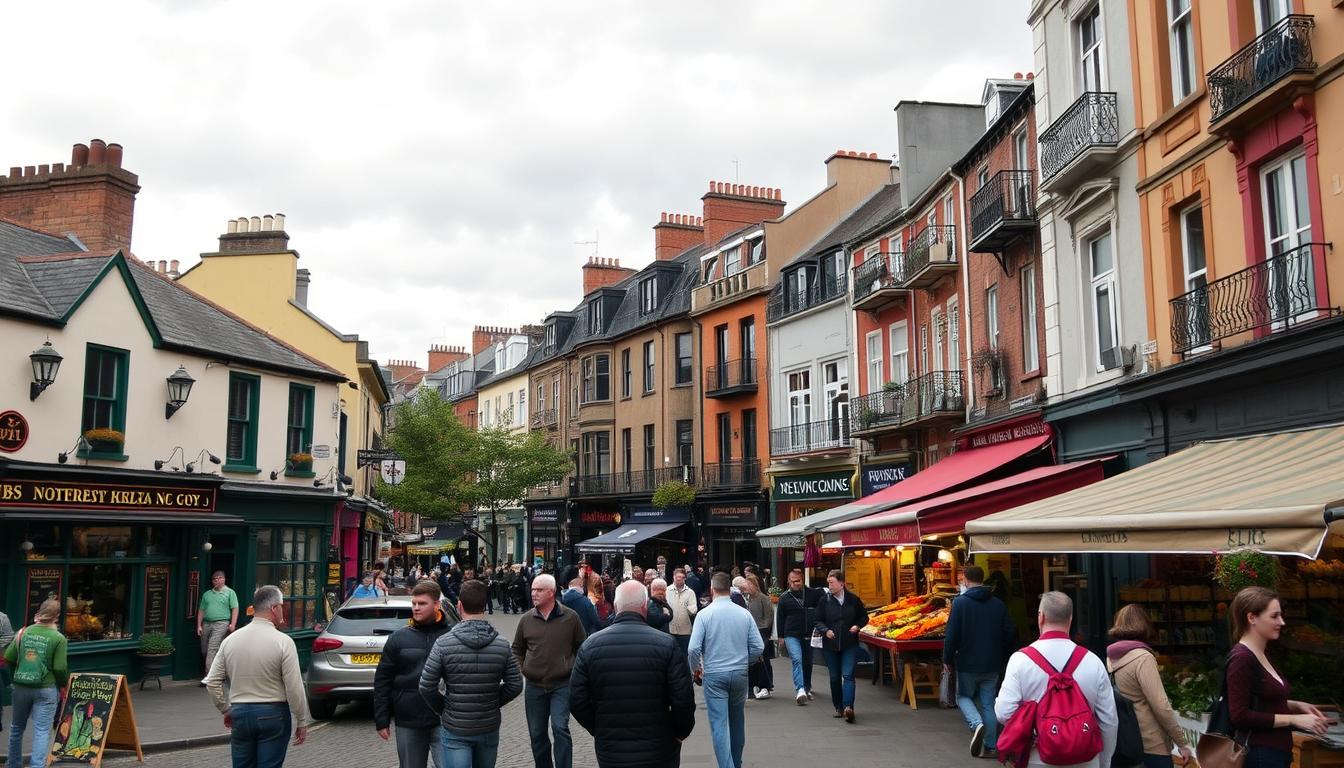For those thinking of moving or managing their budget in Ireland, it’s key to understand living costs. These include housing, utilities, food, transport, and healthcare. For families, education, childcare, and fun activities also affect their budget. It’s important to plan your finances well to live comfortably in Ireland.
The Central Statistics Office Ireland, Numbeo, and Expatistan highlight the importance of knowing these costs. They help with settling into Irish life smoothly.
Key Takeaways
- The cost of living in Ireland varies significantly based on location.
- Housing remains the largest expense for most residents.
- Utilities and transportation are pivotal in monthly budgeting.
- Healthcare and education costs should be factored into long-term financial planning.
- Entertainment and leisure activities can add to overall living expenses.
Understanding the Cost of Living in Ireland
Living costs in Ireland are shaped by many economic factors. Income levels greatly affect what people spend every day. Over the years, Ireland’s inflation rates have changed, impacting how much money people can buy.
The economy in Ireland is stable, thanks to government support for businesses and foreign investment. This makes it a great place for talent and innovation. But, living in cities can be pricey because of high demand for housing and services. Rural areas might be cheaper but often lack some modern comforts.
Planning your budget in Ireland means knowing about living costs. The Central Statistics Office and other studies provide insights into current trends. This helps with managing your finances.
| Economic Factor | Impact on Living Costs |
|---|---|
| Income Levels | Higher salaries can lead to increased spending power, driving up demand for goods and services. |
| Inflation Rates | Rising prices can erode purchasing power, affecting the cost of essential items. |
| Economic Growth | Growth sectors contribute to job creation and higher wages, influencing overall living standards. |
| Urban vs. Rural | Living costs tend to be higher in urban areas due to demand, while rural areas may offer affordability. |
Housing: Rental Prices in Major Cities
The rental market in Ireland is under a lot of pressure, especially in big cities. These cities see more people wanting homes than there are homes available. This section looks at the average rent prices in Dublin and compares them with cities like Cork and Galway. It’s key for anyone thinking about moving or investing in property.
Average Rent in Dublin
Dublin, being the capital, has the highest housing costs in Ireland. Its job opportunities and lively culture draw many to live there. A one-bedroom apartment in the city centre costs about €2,200. Outside the centre, it’s around €1,800. For a three-bedroom apartment, prices can go over €3,500 in top areas.
Comparisons with Other Cities
Cities like Cork and Galway offer more affordable rent. In Cork, a one-bedroom apartment costs about €1,600 in the city centre. In Galway, it’s around €1,500. Here’s a table showing the rent differences across several major cities.
| City | One-Bedroom Apartment (City Centre) | One-Bedroom Apartment (Outside City Centre) | Three-Bedroom Apartment (City Centre) |
|---|---|---|---|
| Dublin | €2,200 | €1,800 | €3,500 |
| Cork | €1,600 | €1,300 | €2,800 |
| Galway | €1,500 | €1,200 | €2,500 |
Utilities: What to Expect Monthly
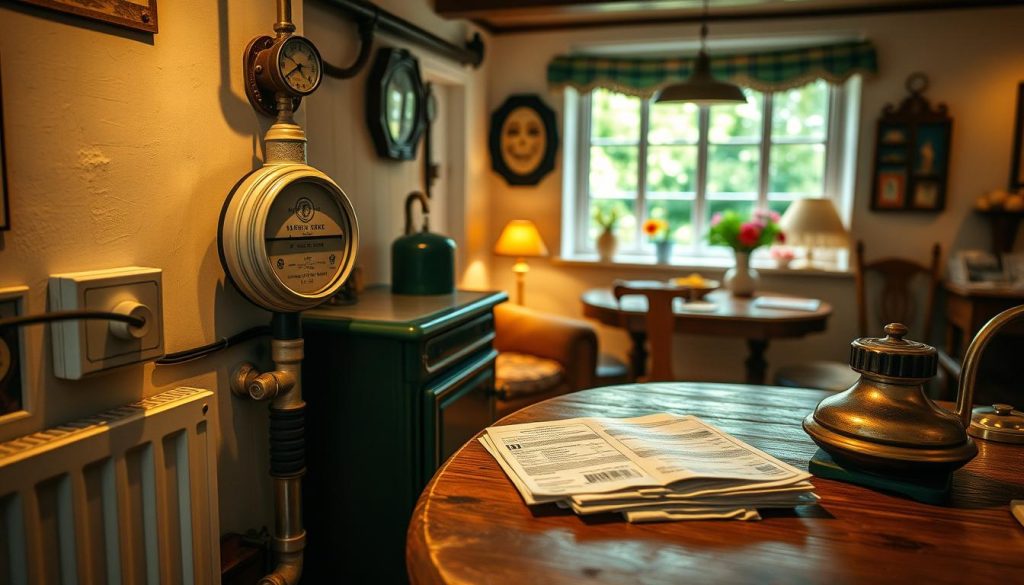
Knowing what you’ll pay for utilities each month is key to managing your budget. These costs cover essential services like electricity, gas, water, and waste management. We’ll look into these costs to give you a clear idea of what you might pay.
Electricity and Gas Costs
Electricity prices in Ireland have changed a lot lately, affecting your monthly bills. On average, a typical household spends £75 to £150 on electricity each month. This depends on how much you use and the supplier’s rates. Gas bills also add to your costs, usually between £60 to £100.
These prices can change based on where you live and who supplies your energy. It’s a good idea to shop around for better deals.
Water and Waste Charges
Water and waste management fees also add to your bills. You might pay £30 to £50 for water. Waste charges vary, averaging £15 to £25 a month, depending on how often your bins are collected. Using water wisely and choosing efficient waste options can help keep these costs down.
| Type of Utility | Average Monthly Cost (£) |
|---|---|
| Electricity | 75 – 150 |
| Gas | 60 – 100 |
| Water | 30 – 50 |
| Waste Management | 15 – 25 |
Groceries: Essential Shopping Costs
Grocery shopping is a key part of daily life in Ireland. Knowing what groceries cost helps with budgeting. This section looks at the average prices of different foods and compares them across popular stores. This helps consumers make better choices.
Price Comparisons Between Stores
Stores like Tesco, SuperValu, and Lidl have different prices for basic items. Here’s a table showing the average cost of some groceries at these stores:
| Item | Tesco (£) | SuperValu (£) | Lidl (£) |
|---|---|---|---|
| Milk (1 litre) | 1.10 | 1.05 | 0.90 |
| Bread (400g) | 0.85 | 0.80 | 0.70 |
| Eggs (dozen) | 2.50 | 2.40 | 2.30 |
| Chicken Breasts (1kg) | 7.50 | 7.20 | 6.80 |
| Apples (1kg) | 2.00 | 1.90 | 1.70 |
Food Types and Average Prices
Food prices change with the season. Fresh produce costs more when it’s not in season. But, things like pasta and canned goods usually stay the same price all year. Essential items often include:
- Fruits and vegetables
- Dairy products
- Meat and fish
- Pasta and rice
- Canned goods
Knowing how food prices change helps with weekly shopping plans. By watching grocery costs, people can save money.
Transportation: Navigating Ireland’s Cities
Getting around Ireland’s cities offers many transport choices, each affecting your travel costs. Buses, trains, and Dublin’s Luas tram system are great alternatives to driving. It’s key to know the costs to save money.
Public transport is often the cheapest way to commute. Monthly passes can cut down your travel costs a lot. For example, a Dublin Luas pass is about €140 a month. Bus services have similar prices too. Prices vary across cities due to different transport costs.
Choosing to use your own car also has costs. You’ll need to think about petrol prices, insurance, and maintenance. Here’s a table showing what you might spend on a car in Ireland:
| Cost Type | Average Monthly Cost (€) |
|---|---|
| Petrol (average for 1,000 km) | €120 |
| Insurance | €80 |
| Maintenance (servicing and repairs) | €60 |
| Parking | €100 |
Both public transport and cars have their good and bad points for city travel. Public transport is cheaper and better for the environment. Cars offer more flexibility, especially in areas with poor public transport. Thinking about these options helps you make better choices about travel costs.
Healthcare: Understanding Medical Costs
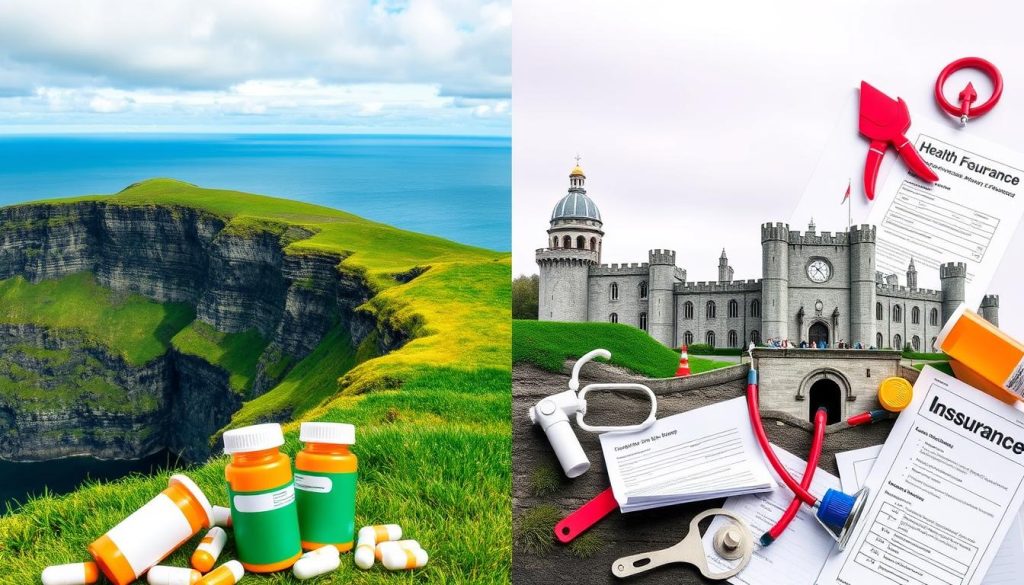
In Ireland, understanding healthcare costs is key. The system is mainly funded by taxes. This gives people access to services through the Health Service Executive (HSE). Having an HSE medical card can lower healthcare costs. It lets people get some services for free or at a lower cost.
Choosing private health insurance can be more convenient but comes with costs. The cost of premiums varies by coverage, age, and health history. It’s important to look at different providers to find the right plan for you or your family.
Here is a table summarising average costs associated with common medical services in Ireland:
| Service | Public Health Costs | Private Health Costs |
|---|---|---|
| GP Consultation | €50 (may be free with a medical card) | €60 – €90 |
| Specialist Consultation | €100 (may be reduced with a medical card) | €150 – €250 |
| Emergency Room Visit | €100 (may be free with a medical card) | €200 – €500 |
| Routine Blood Tests | €25 (may be free with a medical card) | €50 – €100 |
Knowing about these costs helps people make better healthcare choices in Ireland. Getting the right health insurance is key for covering unexpected medical bills. It also helps with peace of mind in health and financial planning.
Education: Schooling Expenses in Ireland
The cost of education in Ireland varies a lot between public and private schools. This affects how families plan their budgets. Knowing the differences helps in choosing the right school. Costs like school fees, uniforms, books, and extra activities add up to the total cost.
Public vs. Private School Costs
In Ireland, public schools are mostly free, but there are costs for uniforms, books, and materials. Private schools charge yearly fees that can be quite high. Here’s a look at the costs in both public and private schools:
| Cost Element | Public Schools (Est. €) | Private Schools (Est. €) |
|---|---|---|
| Annual Tuition Fees | 0 | 5,000 – 15,000 |
| Uniform | 100 – 200 | 200 – 400 |
| Books and Materials | 200 – 300 | 300 – 500 |
| Extracurricular Activities | Varies | Varies (often included in fees) |
The cost of schooling can vary by location in Ireland. Urban areas usually have higher costs because of the demand for good schools and facilities. Families should think about all the factors, including what each type of school offers, to choose the best option for their budget and goals.
Entertainment: The Cost of Leisure Activities
Understanding entertainment costs in Ireland gives us a peek into the local lifestyle and social scene. Leisure activities have different prices, affected by where you are and what you do. This part looks at the costs of eating out, enjoying the nightlife, and visiting cultural spots.
Dining Out and Nightlife Expenses
Eating out is a big part of leisure spending. A meal at a mid-range restaurant costs about €20 to €40 per person. If you choose fast food or casual dining, it’s cheaper, costing between €8 and €15.
Nightlife in Ireland is lively, especially in Dublin and Galway. A pint of beer is around €5 to €7. Club entry fees can be up to €15, depending on the place and event.
Cultural Events and Attractions
Joining in cultural activities adds depth to living costs. Theatre and concert tickets start at €20 and can go up to €100 for top seats. Festivals throughout the year may charge entry fees from €10 to €30.
For families, visiting museums and galleries is a good way to spend time together. Many museums and galleries offer free or low-cost entry, making them great for saving on entertainment costs.
| Activity | Average Cost (€) | Notes |
|---|---|---|
| Meal at Mid-Range Restaurant | 20 – 40 | Varies by location and cuisine type |
| Pint of Beer | 5 – 7 | Common across bars and pubs |
| Club Entry Fee | 10 – 15 | Dependent on the event |
| Theatre Performance Ticket | 20 – 100 | Price varies with popularity |
| Cultural Festival Entrance | 10 – 30 | Seasonal events |
Taxes: An Overview of Living Expenses
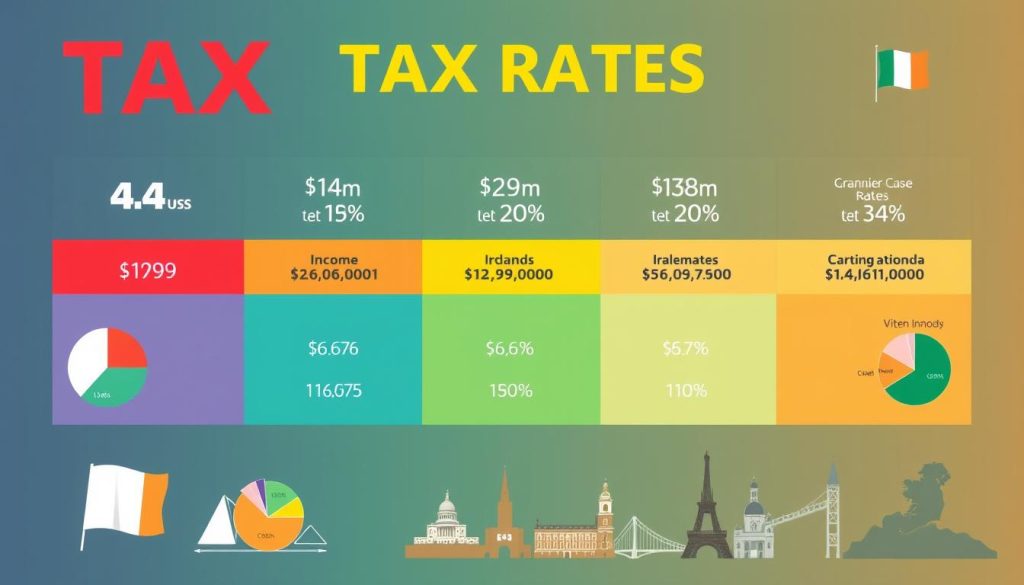
In Ireland, taxes play a big part in the financial lives of people. It’s important to know about tax rates for good budgeting and planning. Income tax is a key way the government makes money. It’s structured so that those who earn more pay a bigger share.
People pay a standard income tax of 20% on earnings up to a certain amount. Anything you earn over that is taxed at 40%. Tax credits help reduce what you owe, making them worth knowing about. For example, the Single Person Tax Credit or the Married Couple’s Tax Credit can save you money.
There’s also Value Added Tax (VAT) on goods and services, with a standard rate of 23%. And, you’ll need to pay local property tax, which depends on your home’s value.
Planning for taxes means keeping up with rates and credits to manage your pay and spending. Using tax credits and knowing about exemptions can improve your finances in Ireland.
| Tax Type | Rate | Description |
|---|---|---|
| Income Tax | 20% / 40% | Progressive tax rates based on income levels |
| Value Added Tax (VAT) | 23% | Standard rate applied to most goods and services |
| Local Property Tax | Varies | Based on the market value of property |
Insurance: Essential Coverage for Residents
Living in the UK means you need to think about insurance to protect your money. You might look at health, home, and car insurance. It’s important to know how much each type costs to plan your budget well.
Health insurance is key for getting medical care without big bills. The NHS helps a lot, but private insurance can give you more care options. This means you might get treated faster and have more treatment choices.
Home insurance is also crucial. It keeps your property and things safe from damage. Whether you own or rent, find an insurance that fits your needs. The cost depends on where your home is, its size, and value. So, it’s smart to compare prices to get a good deal.
The table below shows what you might pay for health and home insurance in the UK. It also gives some details on what each policy covers:
| Insurance Type | Average Annual Cost (£) | Coverage Details |
|---|---|---|
| Health Insurance | 1,500 | Private treatment, faster access, comprehensive coverage |
| Home Insurance | 300 | Contents and buildings insurance, theft, fire damage |
Shopping around for insurance can save you money. Looking at different insurers online lets you compare policies easily. This way, you can pick the best coverage for your needs without spending too much.
Childcare: Budgeting for Young Families
Childcare costs are a big part of the budget for young families in Ireland. With daycare and after-school programmes to choose from, it’s key to understand these costs. Many families struggle to pay for childcare and still keep up with their budget. So, looking into funding schemes and smart budgeting is vital.
Average Fees for Daycare Services
Daycare fees change a lot depending on where you are, the type of care, and what services you get. Here’s a look at what families might pay for different childcare options:
| Type of Care | Average Monthly Fee | Notes |
|---|---|---|
| Full-Time Daycare | €850 – €1,200 | Typically for children aged 0-5 years |
| Part-Time Daycare | €400 – €700 | Flexible options available, usually fewer hours per week |
| After-School Programmes | €200 – €450 | Aimed at school-aged children, may include activities |
| Babysitting Services | €10 – €15 per hour | Use as needed, rates vary by experience |
There are funding schemes to help families with childcare costs. These include government subsidies that can cut down daycare fees a lot. Families should also make a detailed budget, listing must-haves and nice-to-haves. By focusing on childcare costs and looking into financial help, families can manage their budget better and feel more secure.
Cost of Living in Ireland: Key Takeaways
For those thinking of moving or planning their finances, knowing Ireland’s cost of living is crucial. Rental prices in cities like Dublin are quite high. Utilities, groceries, and transport also add to the costs.
It’s vital to budget well, especially for young families and retirees. Childcare and healthcare costs vary by region. Students need to consider the cost of public or private education.
Location greatly affects living costs. Here’s a table with some key financial factors:
| Expense Category | Average Cost (Monthly) | Notes |
|---|---|---|
| Rent (Dublin) | €2,000 | Higher than other cities |
| Groceries | €300 | Varies by store and dietary choices |
| Utilities | €150 | Including electricity and gas |
| Transport | €120 | Public transport costs vary |
| Childcare | €800 | Depends on the service |
Knowing these costs helps with financial planning. Being proactive with budgeting can ease financial stress. Regularly checking your finances is key to managing costs well.
Retirement: Living Costs for Seniors
When people retire, knowing about their finances is key. In Ireland, the cost of living in retirement varies. It depends on state pensions, private savings, and more. The state pension gives a basic income, but many might need extra money from savings to keep their lifestyle.
Healthcare costs can greatly affect seniors’ finances after retirement. As people get older, medical bills often go up. To manage this, many retirees think about moving to a smaller home. This helps cut living costs and puts more money towards things they enjoy, like hobbies or trips.
It’s vital to have a good plan for managing money in retirement. Seniors should look at their income and what they might spend. This way, they can enjoy their retirement without worrying about money. Good budgeting helps Ireland’s older people have a happy and secure retirement.
